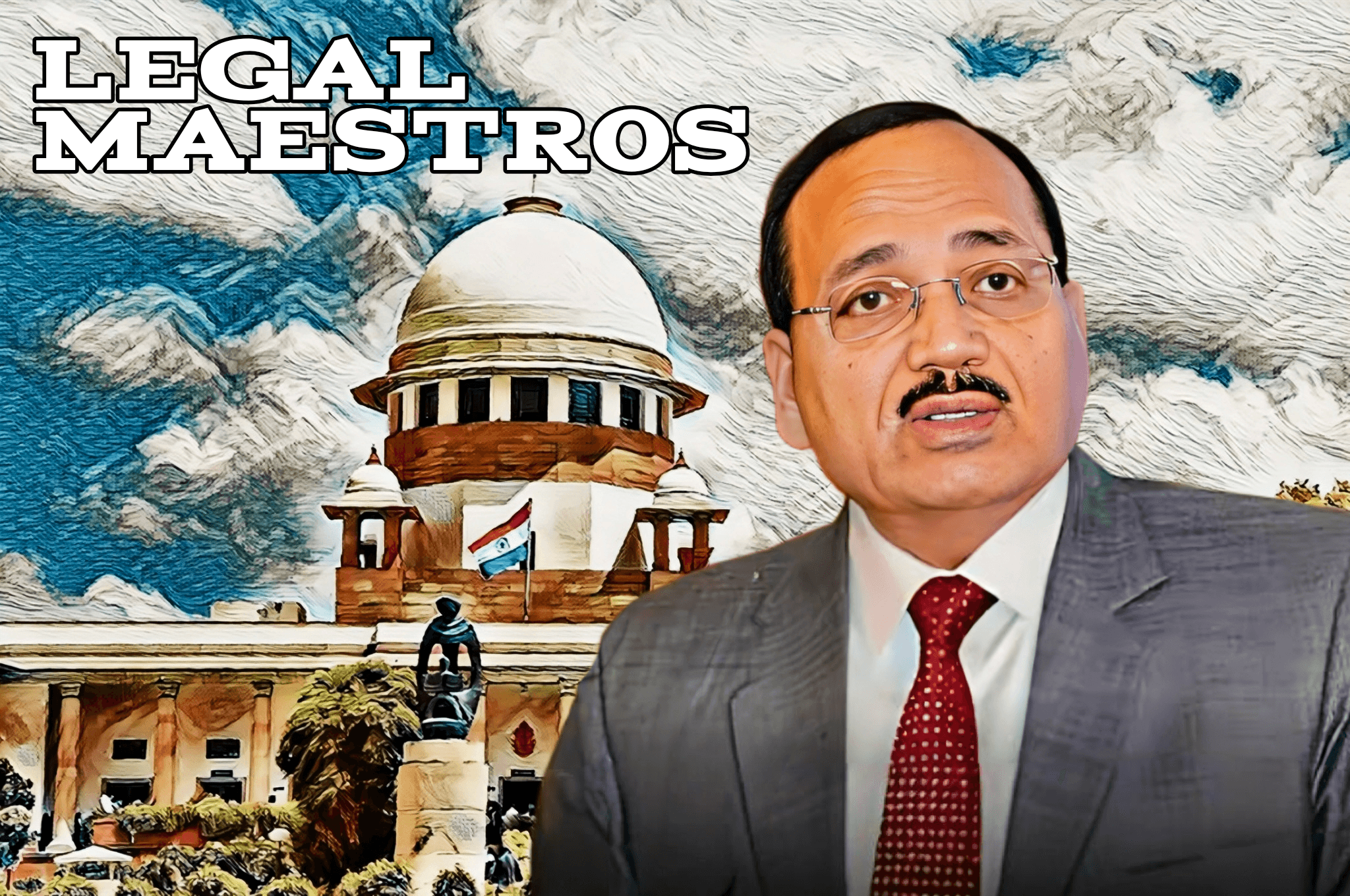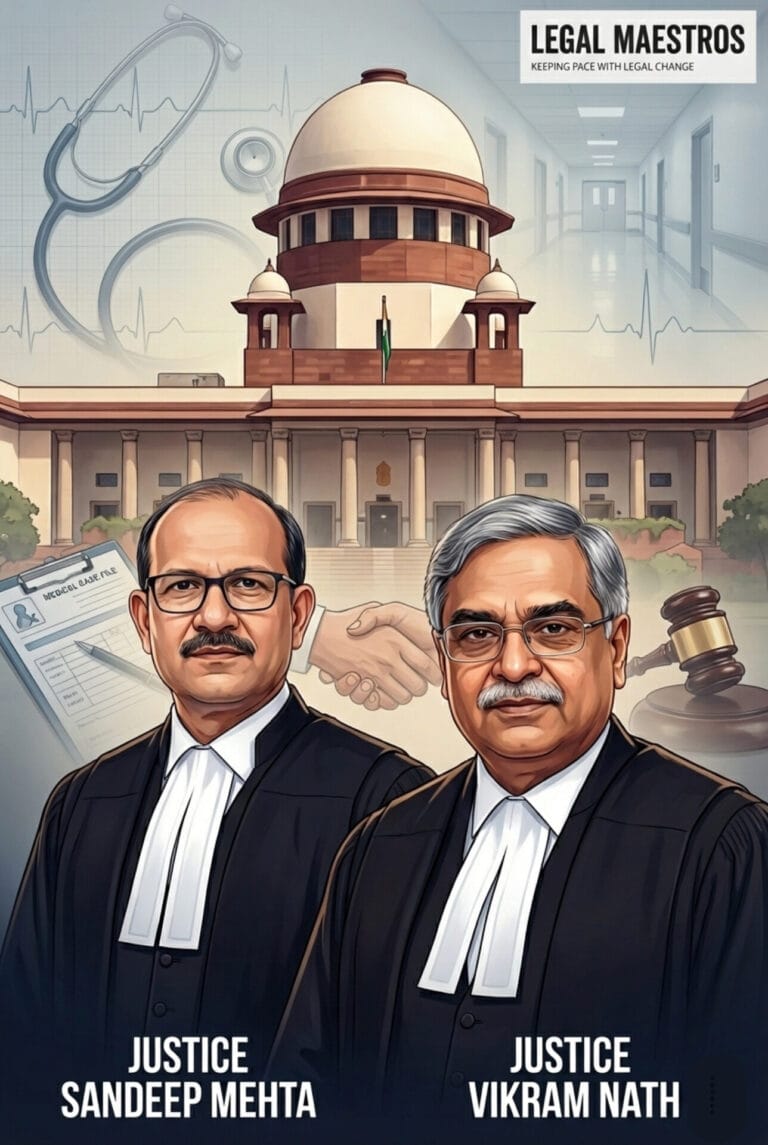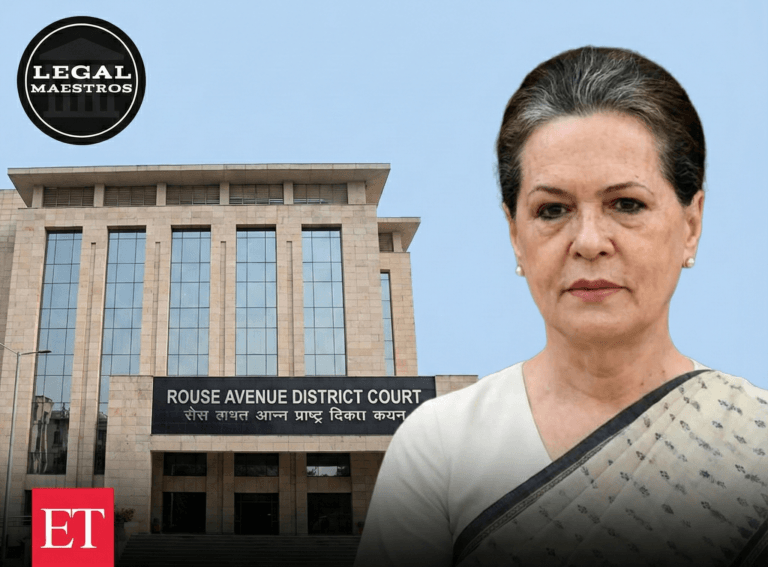
The case of Vinod Infra Developers Ltd. v. Mahaveer Lunia & Ors., Civil Appeal No. 7109 of 2025, was recently heard by the Supreme Court of India, which issued an important verdict in the matter.
The provisions of the Code of Civil Procedure, the Registration Act, and the Transfer of Property Act are all strengthened by this ruling, which explains crucial sections. The primary concerns were on the validity of transactions that were carried out through documents that were not registered, as well as the appropriate forum for the adjudication of title disputes that were associated with immovable property.
The Court stressed the significance of exercising judicial discretion when dealing with applications submitted in accordance with Order VII Rule 11 of the CPC. Additionally, the Court reaffirmed the well-established principle that civil courts have exclusive jurisdiction over property issues that include ownership and title.
For any queries or to publish an article or post or advertisement on our platform, do call at +91 6377460764 or email us at contact@legalmaestros.com.
A Concise Review of the Situation
Appellant Vinod Infra Developers Ltd. asserted that they were the rightful owners of a certain piece of agricultural property in Jodhpur that they had purchased in 2013. The company was able to secure a loan of ₹7.5 crores from Mahaveer Lunia, who was the respondent number one, in the year 2014.
Both the Managing Director and Respondent No.1 were given permission to sell the land by a resolution passed by the board. A power of attorney that was not registered and an agreement to sell were both executed in favor of Respondent No. 1 as a result of this.
A number of attempts were made by the appellant in 2022 to refund the loan and collect the original documents; however, they were met with no cooperation. A resolution was voted by the board that revoked the authority, and the power of attorney was also revoked because of this decision.
Although this was the case, Respondent No. 1 went ahead and signed and registered sale deeds in his and the other respondents’ favor. After that, the appellant initiated a civil lawsuit, in which they requested declarations, possession, and an injunction.
Respondents submitted a motion to reject the plaint in accordance with Order VII Rule 11 of the Canon of Civil Procedure, which was initially rejected by the trial court. After some time had passed, the High Court granted the motion but dismissed the complaint. The appellant filed a petition with the Supreme Court demanding that this ruling be considered.
For More Updates & Regular Notes Join Our Whats App Group (https://chat.whatsapp.com/DkucckgAEJbCtXwXr2yIt0) and Telegram Group ( https://t.me/legalmaestroeducators )
Matters of Law That Are Before the Court
If the complaint revealed a cause of action that would be sufficient to sustain a trial.
The question of whether or not unregistered documents, such as a power of attorney and an agreement to sell, have the potential to transfer rights or title.
Whether or whether the subject must be decided by the revenue courts in accordance with the Rajasthan Tenancy Act, or whether or not the civil courts have the authority to do so.
To what extent the High Court was correct in dismissing the complaint in accordance with Order VII Rule 11 of the CPC without taking into account all of the claimed causes of action.
Rule 11 of the CPC, Order VII: Rejection of the Complaint
The Court reaffirmed that, according to Order VII Rule 11 of the CPC, the rejection of a complaint is only permitted in certain circumstances.
These circumstances include the failure to state a cause of action, the suit being banned by law, undervaluation, or inadequate court expenses. It is necessary to evaluate these reasons simply based on the allegations included in the complaint, without taking into account the defense.
The High Court was reprimanded by the Supreme Court for how it handled the second cause of action, which was the execution of sale deeds after the power of attorney was revoked.
The Supreme Court considered this to be essentially academic. It was determined that the High Court made a mistake when it dismissed the entire complaint rather than allowing it to go to trial, despite the fact that it contained substantial concerns that could be resolved through a trial.
Registration Act and Documents That Have Not Been Registered
The notion that documents that are required to be registered, such as agreements to sell and powers of attorney affecting immovable property, cannot be utilized to transfer title unless they are properly registered was recently reiterated by the Supreme Court of the United States.
When arguing that unregistered documents do not have any legal force in conferring ownership or interest in immovable property, the Court cited a number of cases, including S. Kaladevi v. V.R. Somasundaram and Suraj Lamp & Industries v. State of Haryana, amongst others.
In accordance with Section 17 of the Registration Act, papers that pertain to immovable property are required to be registered, while Section 49 of the same act prohibits the use of these documents as evidence to show transactions that involve certain types of property.
In addition, the court explained that unregistered documents can only be utilized for restricted collateral purposes or in claims for specific performance, neither of which were applicable in this particular case.
The requirement of registered sale deeds is outlined in the Transfer of Property Act.
Another provision of the Transfer of Property Act, Section 54, was subjected to an investigation. It makes it abundantly obvious that a contract for sale does not, on its own, constitute an interest in or a charge on the property.
In this particular case, the court took note of the fact that the respondents had not sought specific performance of the agreement to sell, nor had they executed a registered conveyance deed prior to the expiration of the power of attorney.
It was highlighted by the Supreme Court that any alleged transfer of title that was based on such unregistered documents was legally ineffective and void from the inception of the transaction. The legitimacy of the sale deeds that were carried out after the power of attorney had been removed was further compromised as a result of this.
Differences in the Jurisdiction of Revenue Courts and Civil Courts
In accordance with Section 207 of the Rajasthan Tenancy Act, which grants revenue courts exclusive jurisdiction over certain tenancy and landholder concerns, the respondents asserted that the civil suit was not permitted to proceed.
On the other hand, the Supreme Court made it clear that civil courts are the only organizations that have the authority to hear cases that include issues of ownership, title, and the legality of sale documents.
The Supreme Court of India, citing the cases of Suraj Bhan v. Financial Commissioner and Jitendra v. State of Madhya Pradesh, declared that revenue entries or mutations in revenue records do not convey title. As a result, any claim involving property ownership must be determined by a civil court.
Deficiencies Relating to Court Fees and Procedures
The appellant had not paid the appropriate court fee and had not specifically pleaded for the redemption of the mortgage, which was another issue that was presented.
This position was rejected by the court, which cited the case of Tajender Singh Ghambhir v. Gurpreet Singh, in which it was decided that courts are required to provide plaintiffs with the opportunity to fix any faults that may exist prior to rejecting a complaint.
According to the decision of the Court, procedural flaws such as insufficient court fees should not result in the complete dismissal of a complaint if the flaws are able to be remedied and the plaintiff is prepared to comply with the court’s decision.
As well as the rejection of the complaint, there are many causes of action.
A significant clarification was provided by the Supreme Court, which stated that a complaint cannot be dismissed in its entirety if even a single cause of action is valid.
Using the case of Central Bank of India v. Prabha Jain as a reference, the court decided that distinct reliefs resulting from different causes of action need to be evaluated independently, and that a flaw in one of the reliefs cannot render the entire complaint invalid.
The Court came to the conclusion that the High Court had made a jurisdictional error when it failed to take into account the fact that the sale deeds were issued after the power of attorney had been revoked, which meant that judicial scrutiny was required.
The decision of the High Court was overturned by the Supreme Court, which also declared the ruling of the trial court to be reinstated and ordered that the complaint be re-entered into the official record.
It stressed that serious matters relating to title and validity of sale deeds executed on the basis of unregistered and revoked documents are triable issues that must be decided over the course of a full-fledged trial and should not be rejected at the threshold.
The scope of summary dismissal under procedural statutes is restricted as a result of this verdict, which also emphasizes the significance of registration in real estate transactions further.
In addition to this, it elucidates the jurisdiction of civil courts in matters pertaining to title disputes and the disposition of lawsuits that involve several forms of action. In addition to upholding the substantive right to be heard before a competent forum, the ruling serves as a cautionary tale against the exploitation of procedural procedures in order to prematurely end genuine litigation.







